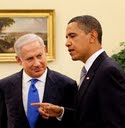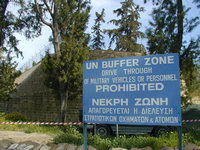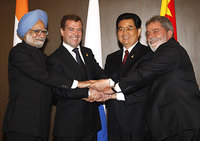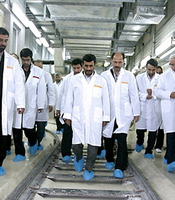The plight of migrant workers around the world got significant attention from rights advocates this week ahead of International Labor Day on May 1. Across the globe, according to advocates, migrant workers face a broad range of serious human rights abuses that range from unpaid wages and long working hours, to sexual abuse and murder. Hundreds of thousands of migrant domestic workers continue to face abuse in Asia and the Middle East despite moves by several governments to reform legislation and provide better training for law enforcement, Human Rights Watch charged in a new report. Most of the domestic workers, […]
Middle East & North Africa Archive
Free Newsletter

One week ago, headlines around the world announced a definitive decision by Israeli Prime Minister Benjamin Netanyahu. The news, on the surface, was not good. “Netanyahu Rejects Settlement Freeze,” shouted newspapers the world over. But there was something a little too final about the announcement. For months since U.S. President Barack Obama had demanded a freeze in construction in the Occupied Territories, Netanyahu had been seeking a formula to placate Washington. Now, suddenly, his office was eagerly confirming the news that he was giving a firm, “No,” to Israel’s most important ally. It was all a little suspicious. Few items […]
In the span of the last 10 days, Iran dropped its bid for a seat on the United Nations Human Rights Council, only to turn its sights instead on a position on a U.N. commission devoted to the protection of women’s rights. In the meantime, a senior Iranian cleric claimed that scantily clad women are an indirect cause of earthquakes, leading to a protest on social media sites around the world. No country in the world has a spotless human rights record, but Iran is a perennial target for human rights advocates for everything from its attacks on free speech […]

At first glance, it is difficult to put a positive spin on hardliner Dervis Eroglu’s victory in Turkish Cyprus’ presidential elections on April 18. The result certainly challenges the future of negotiations to reunify the 1.1 million inhabitants of the Mediterranean island, 80 percent of whom are Greek Cypriots and 20 percent Turkish Cypriots. Eroglu, who has been prime minister of the self-declared Turkish Republic of North Cyprus for 19 of its 27 years, won just over 50 percent of the votes. President Mehmet Ali Talat, the pro-compromise incumbent whose pledge to solve the Cyprus problem had brought him to […]

The summit meetings held last week in Brasilia — of both the India-Brazil-South Africa forum (IBSA) and the Brazil-Russia-India-China group (BRIC) — seem to confirm that any Iran sanctions resolution likely to secure passage in the United Nations Security Council will not live up to the Obama administration’s expectations. The leaders of the emerging “world without the West” — who all traveled to the Brazilian capital after attending the Nuclear Security Summit in Washington — were able to compare notes from their bilateral meetings with U.S. President Barack Obama as well as from other communications with senior U.S. officials. Indian […]
The Interpreter has published a very powerful and moving letter from a reader and Afghanistan war veteran that’s really worth reading. Along with this post by Robert Farley, it serves as a junction between what had been two parallel threads I’ve been following on the myth of “antiseptic war.” One, to which the reader was responding, has to do with the relation between video games and networked war, which Sam Roggeveen discussed here. The other has to do with COIN and population-centric warfare, and specifically the misconception of it as a “kinder and gentler” form of war, which Michael Cohen […]
I just started browsing through this new publication from the Strategic Studies Institute, “Short of General War,” and found the chapter on al-Qaida and RMA by Lt. Col. Thomas Graves thought-provoking. Graves runs through the goals of the 1990s RMA and subsequent Donald Rumsfeld-era “transformation” and suggests that al-Qaida represented a pretty close approximation of the ultimate RMA-inspired military organization, which Stephen Biddle described as “a leaner, faster, higher-technology force that exploits the connectivity of networked information to outmaneuver, outrange, and demoralize enemy forces without requiring their piecemeal destruction in close combat.” That got me thinking about the tactical-strategic rap […]
A few days after posting this about the impact of COIN on armor, I ran across this Gian Gentile piece over at Small Wars Journal, basically arguing that the U.S. Armor Corps is dying a slow death by negligence. That spawned an Internet-wide debate that SWJ collected here. I’d add Paul McLeary’s Ares post on the subject as well. In the meantime, it looks like China and Turkey are two other places where the job prospects for tank commanders are bright. The fact that China still place such a heavy doctrinal emphasis on armor is certain to embolden the COIN-skeptic […]

The most likely source of political and social unrest in the Middle East over the next 20 years is not warfare or military coups — it’s water. Military threats get all the press, but water is the real game-changer. It is no secret that the Middle East is water-starved. Of the 15 most water-poor countries in the world, 10 are in the Middle East. When King Abdul Aziz ibn Saud first brought geologists to the Kingdom of Saudi Arabia, they were there to look for water, not oil. What they found changed the kingdom, and changed the region. Over the […]
With the conclusion of the Nuclear Security Summit in Washington, Iranannounces its own nuclear conference. The gathering, being held onSaturday, is called “Nuclear Energy for All, Nuclear Weapons for Noone” and some countries such as Russia have said they will attend. AlJazeera’s Nazanine Moshiri talked with Manouchehr Mottaki, Iran’sforeign minister, and asked about the conference.
I could have included this in my previous post on President Barack Obama’s nuclear nonproliferation agenda, but it’s significant enough to warrant its own post. As Obama has pushed for UNSC sanctions against Iran, there’s been a lot of tea-leaf reading going on about Russia and China’s willingness to come on board. Parallel to that, there’s been a lesser amount of attention given to the “bad” UNSC that a sanctions resolution faces, and most notably Brazil and Turkey’s opposition to sanctions. But this week demonstrated how those tracks are far from parallel. So even while Russian President Dmitry Medvedev and […]
A couple scattershot thoughts on President Barack Obama’s nuclear nonproliferation agenda in the aftermath of this week’s Nuclear Security Summit: First of all, in combination, there’s no question that the follow-on START treaty, the Nuclear Posture Review and the nuke summit in Washington represent significant, if incremental, successes. From a political optics perspective, Obama achieved a high-priority agenda item, left his mark on a legacy item and demonstrated well-regarded global leadership, in that order. Anyone who doubts the potency of that sequence needs to check their head with a geiger counter. This was a good couple weeks for the president, […]

After months of speculation over whether Russia and China would come on board for a new round of sanctions against Iran, the parameters of a new United Nations Security Council resolution appear to be taking shape. Conversations between President Barack Obama and his Russian and Chinese counterparts, Dmitry Medvedev and Hu Jintao, at this week’s Nuclear Security Summit seem to have produced a consensus among the “permanent five” Security Council members. Two obstacles remain: the actual crafting of any resolution — and whether the final product will pass muster with the U.S. Congress. Up to now, the Obama administration has […]
Jim Lehrer speaks to Under Secretary for Arms Control and International Security Ellen Tauscher about Iran, China and the Nuclear Summit. Tauscher talks about the progress President Obama has made in his efforts to persuade countries attending the summit to better secure their nuclear stockpiles. She says that not only has Obama recieved a committment from attendees to better secure their nuclear material, but the group as also committed to reconvene in 2012 in South Korea to continue to tackle the issue. Having trouble viewing this video? Click here to watch.
A couple of inter-related items on the ongoing shifts in military doctrine and theories of war managed to jolt me out of a self-imposed blogging hiatus (needed to catch up on organizing upcoming feature issues). The first thing that caught my eye was this post over at Information Dissemination on the U.S. Marine Corps’ experiment in company-size autonomous units. I’d noticed this back in December and wondered whether it might not prove an even more lasting impact of our current wars on the U.S. military than the COIN doctrine being applied to fight them. The network of autonomous small units […]
Egypt’s Foreign MinisterAhmed Aboul Gheit talks to NewsHour aboutEgypt’s view of nuclear nonproliferation. Gheit says keeping nuclearmaterial and facilities under tight security is a chief concern in thefight for nuclear nonproliferation, but more importantly he says thatthe Middle East must create a nuclear-free zone. To this end, he saysthat Israel and Iran are the main obstacles to stability in the region,with a particular emphasis on Israel. As a neighbor of Israel and anNPT signatory, Egypt has categorically been opposed to Israel’s policyof ambiguity when it comes to their nuclear program. Having trouble viewing this video? Click here to watch.
